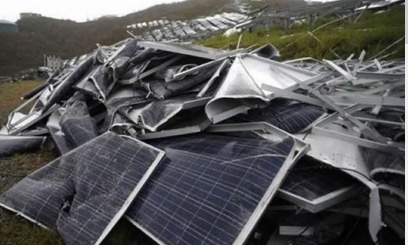Introduction:
As the world embraces renewable energy sources, solar panels have gained immense popularity for their ability to generate clean and sustainable electricity. However, as solar technology advances and older panels reach the end of their lifespan, the issue of responsible disposal becomes increasingly important. Properly disposing of solar panels is crucial to minimize environmental impact and ensure the efficient use of resources. This article explores the art of responsible disposal for solar panel disposal , highlighting the importance of recycling and addressing frequently asked questions surrounding this topic.
The Lifespan of Solar Panels:
Solar panels are designed to be durable and withstand harsh weather conditions. However, they have a limited lifespan, typically ranging from 25 to 30 years. Over time, the efficiency of solar panels gradually declines, making them less effective at converting sunlight into electricity. When solar panels become inefficient or damaged beyond repair, it is essential to dispose of them properly to avoid environmental harm.
The Environmental Impact of Improper Disposal:
Improper disposal of solar panels can have significant environmental consequences. Solar panels contain various materials, including glass, metals, and semiconductors, some of which are hazardous to the environment. If improperly discarded in landfills, these materials can leach into the soil and contaminate groundwater, posing a risk to human health and ecosystem integrity. Furthermore, solar panels are composed of valuable resources that can be recycled and reused, reducing the demand for new raw materials.
The Importance of Responsible Disposal:
Responsible disposal of solar panels is crucial for several reasons:
a) Environmental Preservation: By recycling solar panels, we reduce the need for mining and extraction of raw materials. This helps preserve natural resources, minimize pollution, and lower greenhouse gas emissions associated with manufacturing processes.
b) Compliance with Regulations: In many regions, there are regulations in place that require the proper handling and disposal of electronic waste, including solar panels. By adhering to these regulations, individuals and businesses can avoid legal consequences and demonstrate their commitment to environmental stewardship.
c) Protecting Human Health: Hazardous materials present in solar panels, such as lead and cadmium, can pose health risks if not handled and disposed of properly. Responsible disposal ensures the protection of workers involved in the recycling process and prevents the release of toxins into the environment.
The Process of Responsible Disposal:
Responsible disposal of solar panels involves several key steps:
a) Evaluation: Before disposal, it is important to assess whether a solar panel is still functional or if it can be repaired and reused. If the panel is no longer viable, it should proceed to the next stage of the disposal process.
b) Collection: Solar panels should be collected separately from regular waste to ensure proper handling. Local recycling centers, waste management facilities, or specialized e-waste recycling companies often accept solar panels for recycling.
c) Recycling: Solar panel recycling involves the separation and recovery of valuable materials. The panels are dismantled, and components such as glass, metals, and semiconductors are carefully separated. These materials can then be recycled and used in the production of new solar panels or other products.
d) Proper Disposal of Hazardous Waste: In cases where certain components, such as the panel's backsheet, contain hazardous materials, they must be disposed of in accordance with local regulations and guidelines for hazardous waste management.
Frequently Asked Questions (FAQ):
Q1: Can solar panels be recycled?
A1: Yes, solar panels can be recycled. Through specialized recycling processes, the valuable materials present in solar panels can be recovered and reused in the manufacturing of new panels or other products. Recycling not only conserves resources but also minimizes environmental impact.
Q2: How can I find recycling centers or facilities that accept solar panels?
A2: Local recycling centers, waste management facilities, or specialized e-waste recycling companies may accept solar panels for recycling. It is advisable to check with your local government or environmental agency for information on e-waste recycling facilities in your area.
Q3: What happens to the materials recovered during solar panel recycling?
A3: The materials recovered during solar panel recycling, such as glass, metals, and semiconductors, can be used in the production of new solar panels or other products. By recovering these materials, recycling helps conserve natural resources and reduce the environmental impact of manufacturing processes.
Q4: Is it safe to recycle solar panels containing hazardous materials?
A4: Yes, it is safe to recycle solar panels containing hazardous materials if the recycling process is carried out properly. Specialized recycling facilities employ workers trained in handling hazardous materials safely and follow strict guidelines and regulations for hazardous waste management.
Q5: What are the consequences of improper disposal of solar panels?
A5: Improper disposal of solar panels can lead to environmental harm, as hazardous materials can leach into the soil and contaminate groundwater, posing a risk to human health and ecosystem integrity. Improper disposal also wastes valuable resources that could be recovered and reused through recycling.
Conclusion:
As the world moves towards renewable energy, solar panels have become an increasingly popular choice for generating clean and sustainable electricity. However, as solar technology advances and older panels reach the end of their lifespan, the issue of responsible disposal becomes increasingly important. Properly disposing of solar panels is crucial to minimize environmental impact and ensure the efficient use of resources. By recycling solar panels, we can reduce the need for mining and extraction of raw materials, conserve natural resources, and minimize pollution. Furthermore, responsible disposal of solar panels helps protect human health and complies with regulations. It is essential to educate ourselves on responsible disposal methods to ensure that we are doing our part in protecting the environment and promoting sustainability.


No comments yet